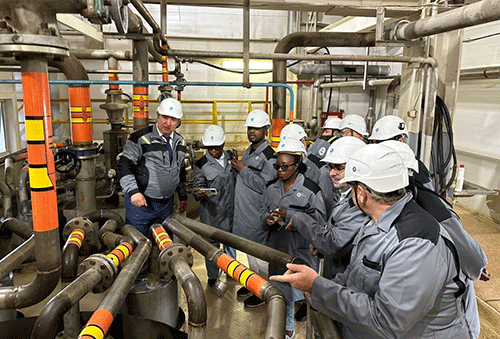SWAKOPMUND – A councillor from the Erongo region expressed his discontent over the impact mines have made in Namibia, despite raking in billions from the country’s natural resources.
Dâures constituency councillor Kennedy !Haoseb says Namibians no longer need soup kitchens and food donations from the mining sector but classrooms, libraries and training facilities.
The mining industry earlier this year indicated they recorded N$928 million, and it is the leading gross domestic product contributor in Namibia.
Shortly after the Erongo governor Neville Andre briefed them on the contributions of the sector to the country, the unhappy !Haoseb said although some mines have made real contributions, the majority are yet to do so.
They are failing to make a real impact in Namibia despite earning billions in revenue, he said.
“I was very disappointed when the governor reported on the social returns of the mining sector to the Namibian people. It was all about assisting kindergartens, soup kitchens, and donating food parcels. I think we moved passed that stage already. They are taking our resources, and we cannot expect them to give something to a soup kitchen and be satisfied. That is an insult to the people of Namibia,” !Hoaseb said.
According to him, Namibians want better benefits that will allow Namibians to become self-reliant, instead of creating a begging and dependency culture.
“They should build schools, libraries and training facilities, such as the Namibia Institute of Mining and Technology that was donated by Rössing Uranium. Those are the type of benefits we want to see, instead of soup kitchens and food. The mining sector can do better. It is, after all, our resources,” !Haoseb said.
Meanwhile, Andre, during his state of the region address (Sora), said Rössing Uranium supported the Rössing Foundation and other community initiatives with
about N$14 million, of which N$1.6 million was Covid-19-related donations and over N$400 000 was in-kind and cash contributions to community initiatives.
According to him, Swakop Uranium focused on the development of local skills – internally and externally – through the company’s bursary scheme, graduate programme, vocational training programme and job attachment programme.
“Swakop Uranium’s efforts to build a stronger and more sustainable Namibia manifests in more ways than education. They inject, on average, N$3 billion into the local economy through local purchasing. It is also worth noting that Swakop Uranium was the main sponsor of this year’s edition of the Erongo Governor’s Cup,” Andre said.
He also indicated that Langer Heinrich Uranium donated fuel to the Namib Anti-Poaching Unit to aid the fight against poaching in the Namib Naukluft Park.
“They also donated two oxygen concentrators as well as six Multivac suction units to the health ministry in the region and also sponsored a water point at the annual Nedbank Desert Dash, held in December last year. They also donated redundant equipment to NIMT,” he said.
Meanwhile, Orano mining Namibia sponsored emergency response activities, education and development through sport and culture.
They also assisted the region to set up a field hospital in Swakopmund and food donations to local soup kitchens and rural communities.
Another mine, Bannerman Resources, according to the governor, supported the governor’s cup with team uniforms, training material, food parcels, 20 oxygen generators and medicine among others.


